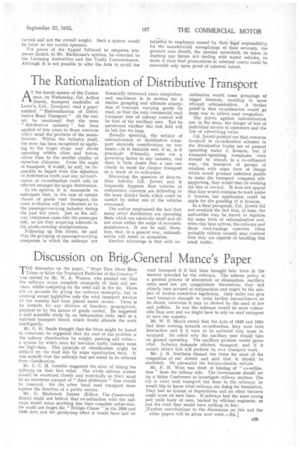The Rationalization of Distributive Transport
Page 35

If you've noticed an error in this article please click here to report it so we can fix it.
AT the fourth session of the Conference, on Wednesday, Col. Arthur Jerrett, transport controller of Lewis's, Ltd., Liverpool, read a paper entitled "Rationalization of Distributive Road Transport." At the outset, he mentioned that the term " distributive industry" has been applied of late years to those concerns which retail the products of the manufacturer. Within the industry itself, the term has been recognized as applying to the larger shops and stores operating within cities and towns, rather than to the smaller retailer of suburban character. From the angle of transport, it would, he said, be impossible to depart from this definitiou of distributive trade, and any rationalization or co-ordination could only be effected amongst the larger distributors.
In his opinion, it is reasonable to anticipate that, in the case of certain classes of goods road transport, the same evolution will be witnessed as in the passenger-carrying industry during the past few years. Just as the railway companies came into the passenger side, so are they acquiring interests in the goods-carrying amalgamations.
Following up this theme, he said that the grouping of passenger-carrying companies in which the railways are
financially interested nears completion, and machinery is in motion for a similar grouping and ultimate absorption of concerns carrying goods by road, so that the only commercial road transport free of railway control will be that of the ancillary user. But he questioned whether this rich field will be left free for long.
Broadly speaking, the subject of rationalization of distributive transport demands consideration on two issues:—Is it desirable and, if so, is it practical? Primarily, costs are a governing factor in any industry, and there is little doubt that a case can clearly be made for cheaper transport as a result of co-ordination.
Discussing the question of door-todoor delivery Col. Jerrett said it frequently happens that vehicles of competitive concerns are delivering in the same district loads which could be carried by either one of the vehicles concerned.
The author emphasized the fact that many retail distributors are operating fleets which are relatively small and do not come within the scope of economic maintenance. It can be said, therefore, that, in a general way, rationalization will result in economies.
Another advantage is that with co
ordination would come groupings of bigger interests, resulting in more efficient administration. A further pointsis that co-ordination would go some way to relieve road congestion.
The points against rationalization are, in the main, the danger of loss of individual service to customers and the loss of advertising value.
Col. Jerrett pointed. out that concerns involved in co-ordination schemes in the distributive trades are at present operating under C licences, but if transport-operating companies were formed to absorb, in a co-ordinated way, • the transport of groups of retailers, with some form of charge which would produce sufficient profits to make the transport company selfsupporting, they would then be working for hire or reward. It does not appear that they would continue to work under C licences, but application could be made for the granting of A licences.
In a final paragraph, Col. Jerrett did not overlook the fact that, in time, the authorities may be forced to legislate for some form of rationalization and, when this time arrives, the railways and those road-haulage concerns (then probably railway owned) may contend that they are capable of handling this retail traffic.




















































































